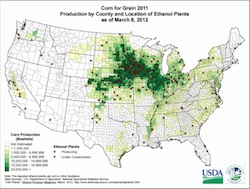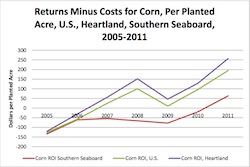 According to an analysis by the Biotechnology Industry Organization (BIO), “food before fuel” is a fight between states. After reviewing eight waiver requests from governors submitted to the U.S. Environmental Protection Agency (EPA), a common argument was farmers in other states have to provide their states’ livestock industries corn. The waivers request a halt, or lowering, of the amount of ethanol that should be blended into fuel as mandated by the Renewable Fuel Standard (RFS). The current drought that has impacted the majority of the U.S. is causing heated discussions about who should get the corn.
According to an analysis by the Biotechnology Industry Organization (BIO), “food before fuel” is a fight between states. After reviewing eight waiver requests from governors submitted to the U.S. Environmental Protection Agency (EPA), a common argument was farmers in other states have to provide their states’ livestock industries corn. The waivers request a halt, or lowering, of the amount of ethanol that should be blended into fuel as mandated by the Renewable Fuel Standard (RFS). The current drought that has impacted the majority of the U.S. is causing heated discussions about who should get the corn.
It wasn’t until recent years that farmers in the U.S. could grow corn at a profit. Instead, most had to rely on federal payments or subsidies. Interestingly, while corn farmers in the Midwest created a new and growing market with ethanol and its by-products, those in Southern states where the waivers were primarily filed, lagged behind the U.S. average in achieving profitability. The core reason: growers were focused on only one market, the livestock industry.
It should be stressed that the corn used for livestock feed and ethanol is NOT the corn used in your corn tortilla. That said, yes, humans are indirectly eating the corn when eating meat (unless the animal was grass fed). But what many don’t understand or choose not to acknowledge, is that one by-product of ethanol production is a high protein based distillers grain, or high-protein animal feed. So you are not losing the entirety of the corn bushel to  produce ethanol – that same bushel is also producing feed. In otherwords, a bushel of corn produces food AND feed AND fiber.
produce ethanol – that same bushel is also producing feed. In otherwords, a bushel of corn produces food AND feed AND fiber.
The analysis points out, rightly so, that what the growers in the Southeastern states should be looking for ways to increase their profitability. “Additional markets for corn – such as conventional biofuel production – could add value to corn grown in Southern Seaboard states.”
The wonderful thing about market dynamics, and the way the RFS was written, is that they are working. The marketplace is sorting out the difference between supply and demand and to intervene would only create a more negative impact than the drought has already.

